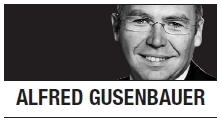VIENNA ― As is customary at the start of a new year, imposing statistics and trend forecasts are being trumpeted worldwide. For example, in 2016, China is expected to replace the United States as the world’s largest economy. And, by 2040, India’s population will have reached 1.6 billion, surpassing China’s, which will have stagnated a decade earlier.

Perhaps the most startling projection is that the U.S. will become an energy exporter by 2020, and will become energy self-sufficient 15 years later, owing to the plentiful supply of inexpensive shale gas and the discovery of massive oil reserves everywhere from North Dakota to the Gulf of Mexico. Despite opposition from environmental groups, these reserves will be easier to exploit than those in Europe, because they are largely located in sparsely populated areas.
As a result, energy will be significantly cheaper in the U.S. than in Europe or China for the foreseeable future. Indeed, shale-gas extraction is so economically favorable that even American gas exported to Europe would cost 30 percent less than what the Russian energy giant Gazprom currently charges.
Cheap energy provides a powerful incentive for energy-intensive industries ― from steel and glass to chemicals and pharmaceuticals ― to locate in the U.S. In fact, the decreased cost of manufacturing in America, combined with the country’s business-friendly regulations, strong rule of law, and political stability, will eliminate the competitive advantage that has driven China’s rapid economic growth over the last several decades.
Meanwhile, American universities still attract the world’s best and brightest in many fields, most notably in science and technology. And the country’s other longstanding advantages ― flexibility, capacity for renewal, economic mobility, international regulatory strength, and the world’s main reserve currency ― remain in place.
Given these favorable conditions, the U.S. has already begun “on-shoring” its industry ― a process that will most likely continue for several decades. As other advanced economies become increasingly services-based, the U.S. is reindustrializing.
The resulting added value will bolster policymakers’ ability to find long-term solutions to persistent problems, including an inefficient health care system, inadequate primary and secondary education, and blatant social injustice. Success in these areas would further enhance America’s appeal as an industrial center.
As part of the Harvard Business School’s U.S. Competiveness Project, Michael Porter and Jan Rivkin recently published an eight-point plan, which could be implemented within the next two to three years. Each proposed measure has generated broad, bipartisan agreement among policymakers (at least behind closed doors).
The plan highlights the need to take advantage of the opportunities afforded by shale gas and newly discovered oil reserves. Low-cost domestic energy could help to lower the trade deficit, spur investment, and decrease America’s economic exposure to volatile oil-exporting countries. A strong federal regulatory framework could help to ensure this result, while minimizing the environmental and safety risks associated with extraction.
Other proposals include easing the immigration of highly skilled individuals, particularly graduates from U.S. universities; addressing distortions in international trade and investment; developing a more sustainable federal budget framework; streamlining taxes and regulations; and initiating an ambitious infrastructure program. By pursuing these strategies, President Barack Obama could restore America’s position as the engine of the global economy.
But implementing the eight policy proposals would also widen further the wealth gap between the U.S. and Europe, which has been growing for the last three decades. In 1980-2005, the U.S. economy grew by a factor of 4.45 ― a level that no major European economy even approached. In 2011, Norway and Luxemburg were the only European countries with higher per capita national income than the U.S. in purchasing power parity terms. And, by 2040, European countries’ populations will have stagnated or shrunk (with the exception of the United Kingdom, which will have a population of roughly 75 million, comparable to Germany), while America’s will have grown to 430 million, from 314 million today.
The political consequences of the U.S. economy’s renewed strength will reverberate worldwide. But maintaining this economic revival will require greater reluctance to intervene in foreign conflicts or engage in new wars.
This recognition has already dampened U.S. policymakers’ support for the Arab Spring uprisings: witness Obama’s hesitation to intervene in Libya and his unwillingness, at least so far, to involve America directly in Syria’s bloody civil war. Although the Arab Spring’s historic significance was initially likened to that of the fall of the Berlin Wall, mounting concern about the Muslim Brotherhood’s increasing political influence is overshadowing the positive potential of change in the region.
Likewise, while the U.S. will not relinquish its bilateral relationship with Israel, relations between Israeli Prime Minister Binyamin Netanyahu and Obama have reached a new low. In this context, a major American peace initiative in the Middle East is unlikely in the foreseeable future.
Meanwhile, America’s former rival, Russia, is struggling to restore its hegemony over many of the ex-Soviet countries. And conditions in Africa and Latin America are generally stabilizing.
Given this, America’s foreign-policy priorities have shifted to the Asia-Pacific region, where the most pressing economic, political, and security challenges ― including the threat of North Korean missiles and rising tensions between China and its neighbors over competing sovereignty claims in the South and East China Seas ― are emerging. Other global challenges appear relatively minor in comparison.
Although the weight of global politics, economics, and, in turn, influence is largely shifting from the Atlantic to the Pacific, it would be a mistake to underestimate America’s role in the new world order. America never really stepped out of the spotlight, and it will continue to play a leading role.
By Alfred Gusenbauer
Alfred Gusenbauer was Chancellor of Austria in 2007-2008. ― Ed.
(Project Syndicate)








